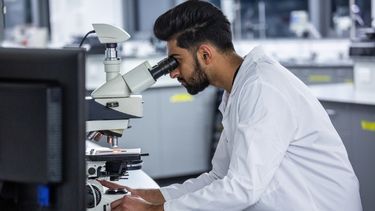
Biomedical Scientist
Biomedical Scientist
As a Biomedical Scientist, you will conduct a wide range of scientific tests to help various healthcare professionals to diagnose, monitor, and manage diseases. You will likely specialise in one of the following areas:
- Infection sciences, which includes medical microbiology and virology
- Cell sciences, such as histopathology and cytology
- Blood sciences: clinical chemistry, transfusion science, haematology and immunology
- Gene sciences like genetics and molecular pathology
Once you graduate, you will have the skills to investigate samples taken during health tests, surgery and blood donation services.
Necessary qualifications and skills
To work as a Biomedical Scientist in Scotland, you will need a degree accredited by the Institute of Biomedical Science (IBMS).
Foundation in life sciencesResponsibilities
- Examine blood samples to monitor organ function and check for blood abnormalities
- Test for diseases, such as infectious diseases, food poisoning, and Legionnaires’ disease
- Assist with blood transfusions and transplants
- Evaluate tissue samples from operations and autopsies
- Provide test results to clinicians and other medical staff
- Monitor the effectiveness of treatment and medicines
- Use automated or specialised testing equipment
- Carry out specialist procedures, such as cell culture to detect cancer
Personal qualities that will help you become a biomedical scientist
- excellent communication skills and teamwork
- good time-management skills
- calm and emotionally resilient
- problem-solving and diagnostic skills
- confident making important decisions
Page Section
Working hours
Your standard working week will be around 37.5 hours per week, potentially including evenings and weekends.
Salary
The average base salary for a Biomedical Scientist in NHS Scotland is around £35,000 per year. The private sector will pay approx. the same amount (depending on experience).
Career prospects
You can choose to take IBMS higher and advance your career with expert qualifications. You could also become a consultant biomedical scientist. Within NHS Scotland, there are lots of opportunities to progress to specialist roles.